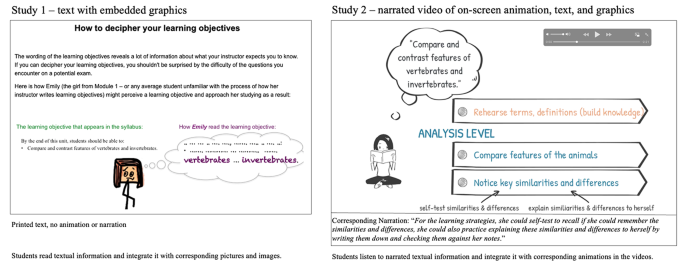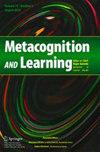Relations between undergraduates’ self-regulated learning skill mastery during digital training and biology performance
IF 4.8
2区 教育学
Q1 EDUCATION & EDUCATIONAL RESEARCH
引用次数: 2
Abstract
Abstract Undergraduate STEM lecture courses enroll hundreds who must master declarative, conceptual, and applied learning objectives. To support them, instructors have turned to active learning designs that require students to engage in self-regulated learning (SRL). Undergraduates struggle with SRL, and universities provide courses, workshops, and digital training to scaffold SRL skill development and enactment. We examined two theory-aligned designs of digital skill trainings that scaffold SRL and how students’ demonstration of metacognitive knowledge of learning skills predicted exam performance in biology courses where training took place. In Study 1, students’ ( n = 49) responses to training activities were scored for quality and summed by training topic and level of understanding. Behavioral and environmental regulation knowledge predicted midterm and final exam grades; knowledge of SRL processes did not. Declarative and conceptual levels of skill-mastery predicted exam performance; application-level knowledge did not. When modeled by topic at each level of understanding, declarative knowledge of behavioral and environmental regulation and conceptual knowledge of cognitive strategies predicted final exam performance. In Study 2 (n = 62), knowledge demonstrated during a redesigned video-based multimedia version of behavioral and environmental regulation again predicted biology exam performance. Across studies, performance on training activities designed in alignment with skill-training models predicted course performances and predictions were sustained in a redesign prioritizing learning efficiency. Training learners’ SRL skills –and specifically cognitive strategies and environmental regulation– benefited their later biology course performances across studies, which demonstrate the value of providing brief, digital activities to develop learning skills. Ongoing refinement to materials designed to develop metacognitive processing and learners’ ability to apply skills in new contexts can increase benefits.

大学生数字化训练中自主学习技能掌握与生物学成绩的关系
本科STEM讲座课程招收数百人,他们必须掌握陈述性、概念性和应用性的学习目标。为了支持他们,教师已经转向主动学习设计,要求学生参与自我调节学习(SRL)。大学生与SRL斗争,大学提供课程、研讨会和数字培训来支持SRL技能的发展和实施。我们研究了两种理论一致的数字技能训练设计,这些设计支撑了SRL,以及学生对学习技能的元认知知识的展示如何预测进行训练的生物学课程的考试成绩。在研究1中,对学生(n = 49)对培训活动的反应进行质量评分,并根据培训主题和理解水平进行总结。行为和环境调节知识预测期中和期末考试成绩;对SRL进程的了解却没有。陈述性和概念性技能水平预测考试成绩;应用级知识则不然。当在每个理解水平上按主题建模时,行为和环境调节的陈述性知识以及认知策略的概念性知识预测了期末考试的表现。在研究2 (n = 62)中,在重新设计的基于视频的行为和环境调节多媒体版本中展示的知识再次预测了生物学考试成绩。在所有研究中,根据技能培训模型设计的培训活动的表现可以预测课程表现,并且在重新设计优先学习效率的过程中,预测得以维持。训练学习者的SRL技能——特别是认知策略和环境调节——有利于他们后来在生物学课程中的表现,这证明了提供简短的数字活动来发展学习技能的价值。不断改进旨在发展元认知加工和学习者在新环境中应用技能的能力的材料可以增加收益。
本文章由计算机程序翻译,如有差异,请以英文原文为准。
求助全文
约1分钟内获得全文
求助全文
来源期刊

Metacognition and Learning
Multiple-
CiteScore
6.20
自引率
15.20%
发文量
39
期刊介绍:
The journal "Metacognition and Learning" addresses various components of metacognition, such as metacognitive awareness, experiences, knowledge, and executive skills.
Both general metacognition as well as domain-specific metacognitions in various task domains (mathematics, physics, reading, writing etc.) are considered. Papers may address fundamental theoretical issues, measurement issues regarding both quantitative and qualitative methods, as well as empirical studies about individual differences in metacognition, relations with other learner characteristics and learning strategies, developmental issues, the training of metacognition components in learning, and the teacher’s role in metacognition training. Studies highlighting the role of metacognition in self- or co-regulated learning as well as its relations with motivation and affect are also welcomed.
Submitted papers are judged on theoretical relevance, methodological thoroughness, and appeal to an international audience. The journal aims for a high academic standard with relevance to the field of educational practices.
One restriction is that papers should pertain to the role of metacognition in learning situations. Self-regulation in clinical settings, such as coping with phobia or anxiety outside learning situations, is beyond the scope of the journal.
 求助内容:
求助内容: 应助结果提醒方式:
应助结果提醒方式:


